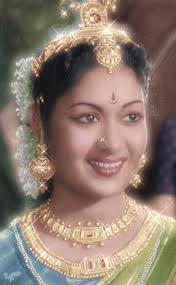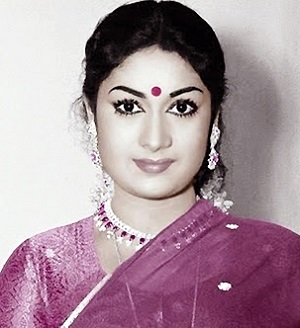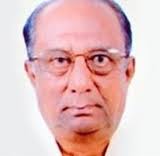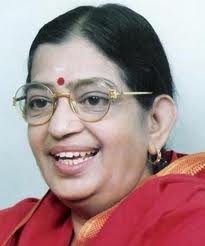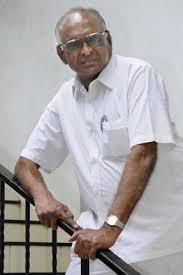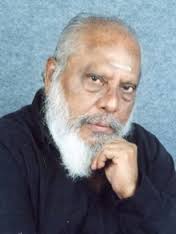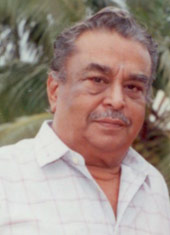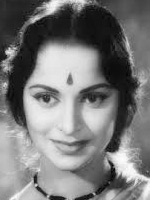
Showing all artists born in 1935
Savithiri
Savitri or Savitri Ganesh, was a Telugu actress, director and producer of films in Telugu, Tamil and Hindi languages. She was known for her liveliness and captivating performance and is still treated as the benchmark for acting in Telugu movies and also called as one of the best actresses of All Time.
Savitri was born in Chinaravuru near Tenali in Guntur District, Andhra Pradesh, India to Nissankara Rao Guruviah and Subhadramma. She learned music and Indian classical dance under Sista Purnayya Sasthri. She performed stage shows during her childhood. She acted in 318 films in Telugu, Tamil, Kannada and Hindi languages, with ten to twenty movies released per year.
She later directed some films. One day she went to meet the Prime Minister Lal Bahadur Shastri and donated all her jewelry she was wearing for the P... See full bio
Savitri was born in Chinaravuru near Tenali in Guntur District, Andhra Pradesh, India to Nissankara Rao Guruviah and Subhadramma. She learned music and Indian classical dance under Sista Purnayya Sasthri. She performed stage shows during her childhood. She acted in 318 films in Telugu, Tamil, Kannada and Hindi languages, with ten to twenty movies released per year.
She later directed some films. One day she went to meet the Prime Minister Lal Bahadur Shastri and donated all her jewelry she was wearing for the P... See full bio
Known For:
Thaiyalkaran
, Saraswati Sabatham
Savitri
Savitri (born Savitri Nissankararao 6 December 1935– 26 December 1981) was an Indian film actress, playback singer, dancer, director and producer. She appeared in Telugu as well as Tamil, Kannada, Malayalam, and Hindi language films. Widely regarded as one of the finest actresses of Telugu cinema, Savitri made her lead role debut with the 1952 Telugu film Pelli Chesi Choodu. In 1960, she received the Rashtrapati Award for her performance in the Telugu film Chivaraku Migiledi. In 1968, she has produced, and directed the Telugu film, Chinnari Papalu for which she received the state Nandi Award for Best Feature Film (Silver). She was honored among "women in cinema" at the 30th International Film Festival of India.
She is best known for her works in award winning films such as Devadasu (1953), Ardhangi (1... See full bio
She is best known for her works in award winning films such as Devadasu (1953), Ardhangi (1... See full bio
Known For:
A. Jagannathan
A. Jagannathan was an Indian film director who worked in the Tamil, Telugu, Kannada an Hindi film industry. He directed nearly 50 films in Tamil.
He made his debut as director in Manipayal in 1973 after working as an assistant to T. Prakash Rao and P. Neelakantan for almost 15 films, most of them being MGR movies. He directed the MGR film Idhayakkani, and some television serials.
He directed Sivaji Ganesan's Vellai Roja which won awards including the Filmfare Award.Another successful venture in his career was Moondru Mugam.
He made his debut as director in Manipayal in 1973 after working as an assistant to T. Prakash Rao and P. Neelakantan for almost 15 films, most of them being MGR movies. He directed the MGR film Idhayakkani, and some television serials.
He directed Sivaji Ganesan's Vellai Roja which won awards including the Filmfare Award.Another successful venture in his career was Moondru Mugam.
P. Susheela
Pulapaka Susheela (born November 13, 1935), popularly known as P. Susheela Telugu,Tamil, Kannada is an Indian playback singer. A recipient of 5 National Awards and numerous state awards, Susheela is widely acclaimed as a singer and is well known for her mellifluous vocal performances for thousands of film songs across South Indian languages. She is also considered one of the rich voiced singers whose pronunciation of the syllables to be more clear and precise in any of the languages she sang. In a career spanning more than four decades, she has recorded numerous songs in various Indian languages including Telugu, Tamil, Malayalam, Kannada, Hindi, Bengali, Oriya, Sanskrit, Tulu, Badaga. She has also sung for Sinhalese films.
She was born in Andhra Pradesh, India, as the daughter of Pulapaka Mukunda Rao, a leading advocate in Vizianagaram, Vizianag... See full bio
She was born in Andhra Pradesh, India, as the daughter of Pulapaka Mukunda Rao, a leading advocate in Vizianagaram, Vizianag... See full bio
Known For:
S. P. Muthuraman
S. P. Muthuraman is an Indian film director who works in the Tamil film industry. He has directed nearly 75 films in Tamil. He was one of the most successful commercial directors in Tamil cinema. Initially he worked mainly with R. Muthuraman, Rajnikanth, Sivaji Ganesan and Kamal Haasan.
In the late 1970s, his association with Rajinikanth proved to be extremely successful, as they went on work together in 25 films. Muthuraman was mainly responsible for moulding Rajini's career and turning him into a commercial star.
He has received two South Filmfare Awards and a Best Director award from the Tamil Nadu State Government. He was also the associate producer of the Rajinikanth starrer Sivaji.
Muthuraman was born in a Chettiar family in Karaikudi.His father Karaikudi Subbiah was an MLA. Muthuraman's younger brother is P... See full bio
In the late 1970s, his association with Rajinikanth proved to be extremely successful, as they went on work together in 25 films. Muthuraman was mainly responsible for moulding Rajini's career and turning him into a commercial star.
He has received two South Filmfare Awards and a Best Director award from the Tamil Nadu State Government. He was also the associate producer of the Rajinikanth starrer Sivaji.
Muthuraman was born in a Chettiar family in Karaikudi.His father Karaikudi Subbiah was an MLA. Muthuraman's younger brother is P... See full bio
M. Bhaskar
M.Bhaskar (Tamil:மா.பாஸ்கர்; 3 April 1935 – 13 July 2013) was a South Indian filmmaker who worked mainly in the Tamil film industry. Bhaskar started his film career as an assistant to director C. V. Sridhar. After relieving from his mentor and guru C. V. Sridhar, he was working under Sundaram's Modern Theaters, Chinnappa Thevar (along with S. P. Muthuraman, Panju Arunachalam, Thuyavan, Uthiripookkal balakrishnan and others). He also worked for the Hollywood Company '20th Century Fox', during their production in Goa, India.
M. Bhaskar hailed from a village called Pattamputhur, Virudhunagar district. He started his career as an associate to C. V. Sridhar. He made his directorial debut with Bairavi. The film gave major breakthrough in the career of Rajinikanth as a lead actor. Ra... See full bio
M. Bhaskar hailed from a village called Pattamputhur, Virudhunagar district. He started his career as an associate to C. V. Sridhar. He made his directorial debut with Bairavi. The film gave major breakthrough in the career of Rajinikanth as a lead actor. Ra... See full bio
Known For:
Sattathin Thirappu Vizhaa
Major Sundarrajan
Sundarrajan (1 March 1935 – 1 March 2003), popularly known as Major Sundararajan, was an Indian actor who performed in Tamil language films.
Biography
Starting as an amateur stage artist while working full-time in the Telecom department in the early 1950s, Sundararajan entered the film world with Pattinathar (1962), directed by K. Somu. After a powerful performance as a blind and retired army official in K. Balachander's Major Chandrakant (1966), he came to be known as 'Major Sundararajan'.
He acted in over 900 films and a few television serials, giving memorable performances in Gauravam, Ethir Neechal, Bama Vijayam, Apoorva Raagangal, Deiva Magan and Deiva Cheyal. He continued to act in stage plays while playing memorable roles on the screen. He acted in a few Malayalam and Telugu movies as well. He has als... See full bio
Biography
Starting as an amateur stage artist while working full-time in the Telecom department in the early 1950s, Sundararajan entered the film world with Pattinathar (1962), directed by K. Somu. After a powerful performance as a blind and retired army official in K. Balachander's Major Chandrakant (1966), he came to be known as 'Major Sundararajan'.
He acted in over 900 films and a few television serials, giving memorable performances in Gauravam, Ethir Neechal, Bama Vijayam, Apoorva Raagangal, Deiva Magan and Deiva Cheyal. He continued to act in stage plays while playing memorable roles on the screen. He acted in a few Malayalam and Telugu movies as well. He has als... See full bio
Known For:
Athey Manithan
, Kallazhagar
, Karnaa
, Raja Muthirai
, Karuppu Nila
, Jai Hind
, Rajadurai
, Gokulam
, Pandithurai
, Vasanthakala Paravai
, Kavalukku Kettikaran
, Sattathin Thirappu Vizhaa
, Thulasi
, Uyarndha Ullam
, Kadamai Kanniyam Kattupaadu
, Neethiyin Marupakkam
, Needhiyin Nizhal
, Nallavanuku Nallavan
, Raja Rishi
, Sandhippu
, Guru
, Kavari Maan
, Pilot Premnath
, Aadu Puli Attam
, Apoorva Raagangal
Waheeda Rehman
Waheeda Rehman is an Indian actress who has appeared in mainly Hindi films, as well as Tamil and Telugu films. She is noted for her contributions to different genres of films from the 1950s, 1960s and early 1970s. She has received a Centenary Award for Indian Film Personality, a Filmfare Lifetime Achievement Award, a National Film Award for Best Actress and two Filmfare Awards for Best Actress, throughout her career. She has been cited as the Bollywood's "most beautiful" actress by various media outlets, a title for which she has received substantial publicity.
Rehman was born in Chengalpattu, Madras Province (now Tamil Nadu), British India. She was in her teens when her father died. Her dream was to become a doctor but, due to her family circumstances and her mother illness, she abandoned her goal. In order, to help her family, she hit the si... See full bio
Rehman was born in Chengalpattu, Madras Province (now Tamil Nadu), British India. She was in her teens when her father died. Her dream was to become a doctor but, due to her family circumstances and her mother illness, she abandoned her goal. In order, to help her family, she hit the si... See full bio
Known For:
Vishwaroopam II

